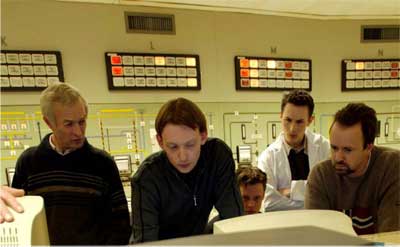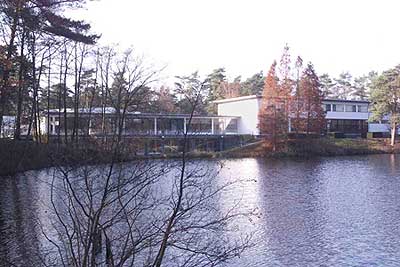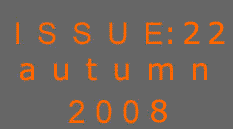
Transfer of knowledge: Education and training possibilities at the Belgian nuclear research centre (SCK•CEN).
Introduction
The Belgian Nuclear Research Centre SCK•CEN was created in 1952 in order to give the Belgian academic and industrial world access to the worldwide development of nuclear energy. It is a Foundation of Public Utility, with a legal status under private law, under the aegis of the Belgian Federal Minister in charge of energy. Since 1991, its statutory mission gives priority to research on issues of societal concern such as the safety of nuclear installations, radiation protection, the safe treatment and disposal of radioactive waste, the fight against uncontrolled proliferation of fissile materials and the combat against terrorism. The Centre also develops, gathers and disseminates the necessary knowledge through education and communications, and provides all services asked for in the nuclear domain (by the medical sector, the nuclear industry and the government). Today, about 600 employees promote the peaceful industrial and medical applications of nuclear energy and are responsible for a turn-over of about €80 M.
SCK•CEN is also an important partner for education and training (E&T) projects in Belgium (for the nuclear, the medical and the non-nuclear sector), as well as at an international level. The Centre's know-how and infrastructure are put at people’s disposal for such E&T opportunities.
Education and training activities
Thanks to its considerable experience in the field of peaceful applications of nuclear science and technology, SCK•CEN has a reputation as an outstanding centre of research, training and education. Its activities focus on the following areas:
-
Guidance for young researchers in the preparation of their theses
-
Co-ordination and organisation of training and education programmes
-
Policy support with regard to applied education and training on a national and international level
-
Research on transdisciplinary aspects of education and training
Guidance for young researchers in the preparation of their thesis
SCK•CEN offers students the possibility to carry out their research at its laboratories.
On a regular basis, final-year Bachelor or Master students visit SCK•CEN and are with their dissertation work helped by our researchers.
In a conscious attempt to increase its pool of highly specialised young researchers and to consolidate its co-operation with the universities, SCK•CEN embarked in 1992 on a bold programme to hire about 10 PhD or post-doctoral researchers every year. These early-stage researchers are recruited in the research domains that reflect the priority programmes and R&D topics covered by our institute.
Coordination and organisation of training and education programmes
Our courses are directed to the nuclear industry, the medical and the non-nuclear industry, national and international policy organisations, the academic world and the general public. E&T programmes are also organised in co-operation with universities, technical universities, nuclear power plants and public and private health services. In addition, SCK•CEN is involved in international research networks and training programmes, i.e. of the European Commission and the IAEA.
SCK•CEN provides courses on a wide range of nuclear topics. The following paragraphs highlight the principal areas of training provided.
Master of Nuclear Engineering (BNEN)
In collaboration with major Belgian universities SCK•CEN organises a one-year Masters programme (60 ECTS) on nuclear engineering. The objective of this Masters is to offer current and future professionals and researchers a solid background in the different disciplines of nuclear engineering. The programme is taught in English. Its high modularity allows for optimal time management for teachers and students, it facilitates individual participation in selected courses e.g. advanced courses in the context of continuous professional development and it also facilitates foreign students participation in blocs of courses.
Nuclear engineering (reactor physics and reactor operation training, nuclear materials issues)
To guarantee the safe operation of present and future nuclear reactors the initial and continuous training of reactor operators has proven to be indispensable. In most countries, such training also results from the direct request from the safety authorities to assure the high level of competence of the staff in nuclear reactors. SCK•CEN organises such courses for, amongst others, reactor operators of the BR2-reactor at the SCK•CEN site, for the reactor operators and operation team heads of the PWR's situated at the DOEL-site (Belgium), and recently also for the new recruits of GDF Suez in Belgium. The main topics covered are nuclear reactor statics and kinetics, thermohydraulics and nuclear materials issues. In addition to the theoretical courses, practical sessions on the BR1 research reactor are also organised. Training courses on reactor operation are also organised as a service for nuclear engineering students at various Belgian and foreign universities and technical universities.

Fig 1. Training of reactor pilots at SCK•CEN
Radiation protection
SCK•CEN's IRP (international school for Radiological Protection) co-ordinates and organises courses that cover all aspects of radiation protection. The series "background and basic knowledge" consists of seven modules (nuclear physics, interaction of radiation with matter, radiation and dose measurements, biological effects, gamma spectrometry, legislation and ALARA and safety culture) and provides the theoretical and practical knowledge required for implementing radiation protection aspects in an industrial, medical or research environment - both in daily practice and in long-term management. A course programme can be extended with one or more modules from the "nuclear and radiological expertise" series (covering topics such as: radon and natural occurring radioactivity, nuclear transport, on-site accident management, organization of emergency planning, radiochemistry, ethical aspects of the radiological risk, …), depending on the specific working environment of the students. On-site practical training exercises are organised and visits to different SCK•CEN installations and laboratories can be included. More information can be found on www.sckcen.be/isrp.
VISIPLAN 3D ALARA planning tool
The application of ALARA and the dose assessment for work in complex environments is a complicated task. Dose values are influenced by the geometry of the installation, source distribution, shielding configuration and work organization. VISIPLAN 3D ALARA planning tool is a PC-based programme developed for the ALARA analyst or the person responsible for the assessment of the dose uptake of the employees. It allows to assess the radiation doses in a 3D environment and to compare different work scenarios. Typically, a three day course explains the VISIPLAN features.
Nuclear emergency management
Off-site nuclear emergency management concepts were reviewed in-depth after the Chernobyl accident. SCK•CEN transmits its know-how in this field through a one-week European training course on "Preparedness and response for nuclear or radiological emergencies". The course aims to give a comprehensive overview of off-site nuclear emergency management, its principles and their application to those involved in emergency planning and response, e.g. health physicists, technical and radiological advisors, civil and environmental protection officers. It covers the following major topics: principles of intervention, radiological evaluations, decision-aiding techniques and the decision-making process leading to optimised management options. The European and international dimensions of the subject are analysed (e.g. EC legislation, ECURIE and EURDEP). Other topics such as health effects, economic consequences and psycho/social aspects are also included.

Fig 2. Nuclear emergency management course
Decommissioning of nuclear installations
With the decommissioning of the BR3 reactor, a European pilot project, SCK•CEN successfully developed best practices for the optimisation of dismantling, decontamination and decommissioning techniques and processes (including the restoration of nuclear sites to so-called 'green fields'). Experience offered in this field also includes the realistic assessment of costs, and the development of techniques for the minimisation of secondary waste and minimisation of radiation doses for personnel. The course on dismantling and decommissioning is based primarily intended for dismantling project managers, safety engineers, health physicists and decontamination and dismantling operators. The course is also of interest to governmental and regulatory bodies dealing with decommissioning.
Radioactive waste disposal
Customised training courses are offered in the field of long-term radioactive waste management. The courses focus on final disposal as the preferred option to long-term radioactive waste management. Waste disposal requires selection and thorough characterisation of a site, characterisation of waste packages and demonstration of long-term safety by means of performance and safety assessment. Courses are generally organised in three areas that are very closely linked, i.e.:
-
Characterisation of radioactive waste packages in relation to their disposal
-
Site selection and site characterisation
-
Integrated safety assessment modelling
Training courses typically last for one to two weeks and generally include hands-on computer sessions, technical workshops or field visits. The courses are directed to individuals having a controlling or supervising role within radioactive waste agencies or nuclear regulatory bodies, or for technical experts who carry out the characterisation of an existing or new site, characterise waste packages, or perform post-close assessments.
Approach
Except for the Masters in Nuclear Engineering, all course programmes are tailored to meet the needs of the students and are available to fit within a larger modular programme.
The courses can be taught at the premises of the customer or at SCK•CEN's Conference Centre, which offer fully-equipped lecture rooms. The Conference Centre is located next to the Technical Centre of SCK•CEN, allowing easy access for the practical training sessions. Several laboratories and installations are available and open to national and foreign students.

Fig 3. SCK•CEN's Conference Centre
The team of lecturers includes engineers, physicists, technicians, biologists, occupational physicians and social scientists who all contribute particular insight, experience and ideas from their specific backgrounds to the course programmes. As SCK•CEN staff members they have a solid knowledge and experience in their field, and can thus directly transfer their theoretical knowledge and practical experience to students.
Research on trans-disciplinary aspects of education and training
Understanding the benefits and risks of radioactivity requires technical knowledge and training, as well as a contextual insight and a sense for the social and philosophical aspects of any situation. In co-ordination with the academic sector, the research of SCK•CEN's International School for Radiological Protection (ISRP) concentrates on how to integrate this trans-disciplinary approach in education and training programmes for as well professionals as students and pupils.
Pupils have a wide attention span and are eager to learn. In our complex society, they should be able to develop an open and critical mind in order to gain more insight into and confidence with regards to multi-faceted issues such as the risks and benefits of radioactivity and nuclear technology, and their possible applications in the medical and energy sector. In this sense, ISRP interacts with teachers of high schools in order to discuss how the standard education programme can integrate a pluralistic approach to complex technical issues such as the applications of radioactivity. The aim is to identify gaps in the existing curriculum and to find out how to establish links between specific courses and how to organise ‘cross-over’ sessions in practice.
With regards to the general public, ISRP works with Belgian industry's visitor centres and with the regional and Belgian state-sponsored communication activities on physics and nuclear science. In co-operation with SCK•CEN-PISA (the programme of Integration of Social Aspects into Nuclear Research), ISRP has build up experience with the theory and practice of participation and involvement in technology assessment. On various occasions, the two groups organised round tables, workshops and focus groups with schools and local communities, and this on topics such as medical applications of radioactivity, (nuclear) energy policy and radioactive waste management.
Policy support with regard to applied education and training on a national and international level
The implementation of a coherent approach to education and training becomes crucial in a world of dynamic markets and increasing worker mobility. Through networking and participation in international programmes, SCK•CEN wants to contribute to the better harmonisation of education, training and skills recognition on both a national and international level.
Covering electricity production, medicine and several activities within the non-nuclear sector, the spectrum of applications of ionising radiation is very wide. Although working with a variety of responsibilities and specific professional aims, practitioners have a threefold common need:
-
Basic education and training providing the required level of understanding of artificial and natural radiation
-
A standard for the recognition of skills and experience
-
An opportunity to fine-tune and test acquired knowledge on a regular basis
From an executive perspective, education and training are undoubtedly the two basic pillars of any policy regarding safety in the workplace. The radiological protection rationale that serves as the basis for this policy is the same all over the world, going beyond cultural differences and disciplinary applications. In this sense, we can see clearly how the implementation of a coherent approach to education and training in radiological protection is crucial in today’s world of dynamic markets and increasing workers’ mobility.
Through networking and participation in international programmes, SCK•CEN aims to contribute to the better harmonisation of training practice and skills recognition on a national and international level. Specific issues of interest to SCK•CEN in general - and the ISRP in particular - are standard requirements for course programmes and educational materials, the development of trans-disciplinary training programmes, e-learning and distance learning, the link between radiation safety and conventional safety, the organisation of experience feedback, the international exchange of knowledge and experience and the sharing of lecturers, training facilities and educational materials. These are the topics covered in European networks such as EUTERP (European Training and Education in radiation Protection Platform) and ENETRAP (European network for Education and Training in Radiation protection), in which SCK•CEN plays a prominent role.
Also on the academic level, SCK•CEN plays an active role in networks such as the ENEN (European Nuclear Education Network), dealing with the preservation and the further development of expertise in the nuclear fields through higher education, through the co-operation between universities, research organisations, regulatory bodies, the industry and any other organisations involved in the application of nuclear science. While ENEN primarily focuses on nuclear engineering, other European networks also focus on education programmes in other domains, such as radiobiology, radioecology or emergency planning. These networks can count on a contribution from SCK•CEN's experts.
Contact
More information on the education and training activities of SCK•CEN can be found at: www.sckcen.be. Alternatively, you can contact Dr. Michèle Coeck, Education and Training Coordinator, Boeretang 200, BE-2400 Mol, Belgium, tel. + 32 14 33 21 80, mcoeck@sckcen.be. |

